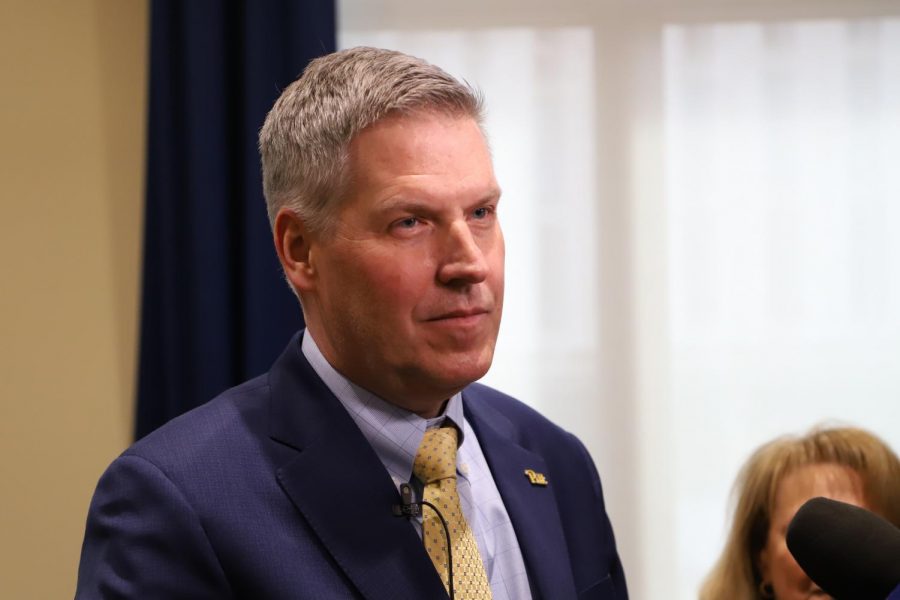Gallagher talks fall semester, political pressure and more in TPN interview


Chancellor Patrick Gallagher spoke with The Pitt News last Friday about the planning for the fall semester, running the University during the COVID-19 pandemic’s latest stage, the ongoing faculty unionization vote, off-campus health guidelines and more.
Chancellor Patrick Gallagher said two weeks into the third academic year in the shadow of the COVID-19 pandemic that there is still no “secret playbook” for how to manage an ever-changing health situation and a “pretty volatile time” in history.
“We’re all going through a pandemic for the first time in our lives, so there’s no secret playbook that some people have that others don’t,” Gallagher said. “Consultation and information and idea sharing has been really important.”
Gallagher spoke with The Pitt News for about 30 minutes last Friday about the planning for the fall semester, running the University during the COVID-19 pandemic’s latest stage, the ongoing faculty unionization vote, off-campus health guidelines and more. The interview was the first time the chancellor took questions from The Pitt News since a May interview.
Classes
Gallagher said the two-week remote option for the start of the fall semester — which Provost Ann Cudd announced on Aug. 20 — will end as planned on Sept. 13. Gallagher said he is doubtful there will be flexibility or an option for remote learning in the future.
“What the provost announced is actually very predictive of the future,” Gallagher said. “We felt that starting the term, bringing everyone back to campus, really for the first time in over a year, in the middle of an outbreak with this much uncertainty, while our testing program was just getting up, and while the confirmation of vaccines process was just underway, it was a prudent thing to give everybody a little bit more optionality for a couple of weeks.”
Gallagher said while there will only be in-person classes beginning next week, the University will provide accommodations for students, faculty and staff who are in need of going remote for medical reasons, particularly if someone contracts COVID-19.
“There will be accommodation but I think it will require more than just worry,” Gallagher said. “This will now go to real medical accommodations and other concerns through our disabilities resources office.”
Gallagher said the lack of a remote option after Sept. 13 is to prevent the quality of classroom instruction from diminishing.
“We can’t add all flexibility back in for everybody at all times without dramatically reducing the quality of the programs,” Gallagher said.
Vaccine mandate
Gallagher said he feels Pitt’s current approach to the virus, which includes differing health rules depending on whether or not a person is vaccinated, is “very protective.” Vaccinated students are not required to follow most health guidelines, including routine testing, contact tracing, shelter in places or quarantining.
“I still believe that the approach we took, which is to require complying with our infection control program as a condition of access to our facilities, was protective, it’s very strong,” Gallagher said. “We have requirements at Pitt — they’re very strong and I believe they’re very protective.”
He faced criticism from the University community for his decision to not require proof of a COVID-19 vaccine, one of which, by Pfizer-BioNTech, now has full regulatory approval from the U.S. government. Pitt’s Faculty Assembly, Senate Council and Student Government Board all expressed support last spring for a vaccine mandate. Gallagher said Pitt administrators are doing their best to listen to community input.
“Everyone’s nervous, the information’s changing everyday. You know, this is just a very difficult environment. If you ask me, is there pressure? Yes. Do people have opinions? Yes. Does the pressure dictate what we do? No — it can’t,” Gallagher said. “The philosophy we’ve taken is, we’ll listen to everybody. We take that input, we respond to as much of it as we can.”
Some have questioned how, if at all, funding from Pennsylvania’s Republican-led legislature has played into the vaccine mandate calculus by state-related universities. Pitt, along with Penn State and Temple, is part of the small club of quasi-private, quasi-public universities that receive money each year from the state to subsidize tuition for in-state students. State-related funding must clear a higher bar of two-thirds support in both chambers to be approved, presenting a possible leverage point for lawmakers.
In an Aug. 12 letter, Penn State President Eric Barron admitted that his decision to not mandate vaccination was partially based on state funding, and the State Senate leader said Penn State would likely face “pushback” if a mandate took effect. Pitt faced challenges in Harrisburg before, such as during summer 2019, when House Republicans raised questions about fetal tissue research at the University.
“The question I think is, is that threat — loss of funding — sufficient to make me not carry out my responsibility to protect the University community. And the flat out answer is no,” Gallagher said. “In a non-preferred appropriation, where it requires a supermajority, it gives lawmakers with views leverage. And it’s a normal part of this process that they threaten, using their leverage to threaten our funding to accomplish certain things.”
Gallagher said he feels possible changes in state funding is “not enough of a lever to dictate how the University operates,” in particular with COVID-19 safety measures. He noted that some Republican-controlled state legislatures banned universities from requiring students to show proof of vaccination against COVID-19, which has not happened in Pennsylvania.
“They’re threatening our students to get me to take actions on various topics, and look — that pressure is a reality. I’m not going to be naive about this. But candidly, it’s my job to deal with that pressure,” Gallagher said. “There’s a big difference between something being unlawful and something that can be a pressure point.”
Faculty unionization
Gallagher also discussed the ongoing vote on faculty unionization. The Pennsylvania Labor Relations Board mailed ballots on the first day of classes to roughly 3,000 professors and researchers from all campuses, and they must cast their vote by Oct. 12 to decide whether or not to form a union. Organizers have three main priorities, including improved pay, job security and transparency between administrators and faculty.
Gallagher said he “probably can’t” say how negotiating with a union would have changed options available for faculty and students this fall. A Wednesday tweet by union organizers said the union would seek to work “cooperatively and collectively” with administrators.
“Being under a collective bargaining agreement I’m sure results in changes. But one of the changes is not our commitment to working with the faculty in shared governance,” Gallagher said. “I don’t follow what union organizers are saying on Twitter. What I can say is that we’ve worked with the faculty, we’ve worked with the staff, we’ve worked with the students, quite robustly.”
Gallagher added that he works with the University Senate leadership and committees on many issues, especially on large decisions.
“I work with them on a very frequent basis, keeping them up to date on what we’re doing and seek their advice and input on all of those decisions,” Gallagher said. “I think no matter what the faculty decide, we’re committed to that. That’s important for our University. We’re committed to continuing that kind of engagement.”
Off-campus health guidelines
After hundreds of off-campus students gathered at the “Welsfest” block party on Aug. 28, Gallagher said while “there’s only so much the institution can do to control that [off-campus] environment,” COVID-19 is still an imminent threat to those who don’t live in University-affiliated buildings.
“The virus doesn’t really care whether you’re on campus or not, right?” Gallagher said. “So the overall risk we all face has to do with the totality of your life, including whether you’re at school, in class or socializing with your friends or living off campus.”
Gallagher said he still believes off-campus students understand their “responsibility” to take steps to prevent the spread of COVID-19.
“A lot of our success last year had nothing to do with specific things Pitt did,” Gallagher said. “It had to do with the fact that our students understood their responsibility and they took steps, even though in many cases they didn’t feel at that much risk from this virus, they took steps to protect themselves and others.”
Gallagher said it’s important to “enlist the support of our student body” as Pitt navigates the pandemic. He said he understands how students may be unsure of what they can and cannot participate in socially, especially after getting vaccinated against COVID-19.
“I think our students did a terrific job last year,” Gallagher said. “I think they’re going to do a terrific job this year and they’re struggling with the same thing we all are, which is, ‘How much can I relax these things that are annoying that impacted our ability to get together and socialize now that I’m vaccinated.’”
According to a campus-wide email sent last Friday, 82% of off-campus and 96% of on-campus students at the Pittsburgh campus have submitted proof of vaccination. The email added that 87% of all undergraduate students on the Pittsburgh campus have submitted proof of vaccination.
Homecoming
Gallagher also said other University activities had to change in response to the latest stage of the pandemic, including planned homecoming events for the class of 2020. After participating in Pitt’s first-ever online commencement just as the pandemic began to strike the country, the University said last March that it would hold in-person activities as part of this year’s homecoming.
Gallagher said the events will move to spring 2022 as a result of the current Delta variant outbreak, so that they can be held outdoors and without masks.
“We thought this was a prudent compromise,” Gallagher said. “We still want to recognize and give those graduates the experience they couldn’t have because of their graduation in the peak of the pandemic. We just didn’t feel like, at this time, it’s going to live up to that expectation.”
Recent Posts
SGB introduces new governing code bill and addresses rumors of ICE on campus
At its weekly meeting at Nordy’s Place on Tuesday, Student Government Board introduced an omnibus…
Opinion | School should be in the summer
Although this may be controversial, I believe that from this data, it is evident that…
Weathering the storm: Pittsburgh teams have tackled some of the toughest environments
The end of the year in western Pennsylvania is always marked by two things —…
Notes From an Average Girl // Notes on Book Banning
In this edition of Notes From an Average Girl, senior staff writer Madeline Milchman writes…
To Be Honest // Yup, it is that damn phone
In this edition of To Be Honest, staff writer Evin Verbrugge writes about her phone…
Meaning at the Movies | Portraying Toxic ‘Adolescence’
In this edition of Meaning at the Movies, staff writer Lauren Deaton explores the mini-series…

